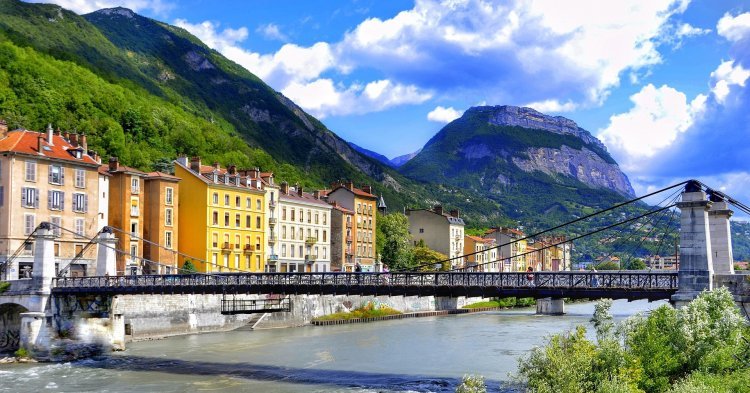Leading by example
From the 2000s onwards, the European Commission has noticed that the European way of life has changed since the creation of the Union. Today, more than two-thirds of Europeans live in cities or large urban areas , where major climatic and ecological challenges are concentrared. In 2006, a group of 15 European cities (Tallinn, Tallinn, Helsinki, Riga, Vilnius, Berlin, Warsaw, Madrid, Ljubljana, Prague, Vienna, Kiel, Kotka, Dartford, Tartu & Glasgow), in partnership with the Association of Estonian Cities and Rural Municipalities, decided to create an award for the most effective cities in protecting the environment. From this desrie to a “green” vision, a Memorandum was born, which sets out the terms and conditions for the title’s award. This project and its slogan “Green cities - fit for life” were endorsed by the European Commission in 2008.
At a time when global warming is becoming more and more a part of our lives and protecting the environment is becoming ever more urgent, it seemed necessary for the European Union to showcase and congratulate the cities that put these issues at the heart of their daily concerns. “Progress is the first reward, but the satisfaction of winning a prestigious European award encourages cities to go even further in their efforts. The award makes the winning cities role models for other cities by showing their good practices in situ ” the Commission explains
In 2010, Stockholm (Sweden) was the first city to be awarded. Each year since, the prize is presented to a city of more than 100,000 inhabitants that fulfills ambitious ecology, sustainable development and climate transition goals. Among the selection criteria are the desire to reduce global warming and adapt inhabitants’ lifestyles, to develop zero-emission public transport and work towards energy efficiency (insulation, changing boilers, etc.) With a cash bonus of €350,000, the prize makes it possible to considerably improve the chosen city’s ecological policy!
Are they really greener cities?
Whilst it’s easy to congratulate the EU’s commitment to promoting greener, environmentally friendly and sustainable cities, it is questionable whether the award-winning cities really are models for the rest of Europe.
Lisbon, for instance, was elected European Green Capital for 2020. While it is true that it has made real progress, all the more so for being the capital of a southern country, which, although it has greatly improved, is still considered to be “a little bit behind”. In 2016, it was the first European capital to sign the new Covenant of Mayors for Climate and Energy. Over the period of 2002-2014, it reduced its CO2 emissions by 50% and its energy consumption by 23%.
Lisbon’s fight against water wastage is also worth a mention, which has become a priority for the city. The municipality has managed to drastically reduce water leaks by tracking them down: they now waste 46% less water and have saved 4 million euros! Lisbons’ actions are simple but effective. Lisbon has repaired taps and turnstiles and changed the pipes in green spaces, cemeteries and public services. In addition, there is no shortage of ideas to “make the city greener”. By 2023, Lisbon hopes to acquire with 400 zero-emission buses and equip its roofs with solar panels, without changing the nature of its various districts. Lisbon also aims to plant 20,000 extra trees to lower its carbon footprint.
In the case of Lahti, which will succeed Lisbon in January 2021, it was its particularly efficient waste management that won over the jury. The Finnish city has succeeded in setting up an efficient waste treatment system, which in turn has created a functional circular economy. In addition, Lahti tackled the problem of air pollution as early as 1997, by implementing a general plan to drastically reduce greenhouse gases.
Grenoble, which has just won the prize, has boasted its 320 km of additional cycle paths and facilities since 2017, its 5,000 trees planted since 2014 and its 23 shared gardens scattered around the city. All this, while radically increasing the proportion of organic and locally produced food in school canteens. It has also stated its desire to have a 100% clean bus network by 2022 , which promotes environmentally-friendly mobility.
Benefits on all levels
For one year, the city designated as European Green Capital is placed in the limelight, a considerable asset when it comes to getting people talking and attracting tourists and investors. Bristol, for example, received £7 million in 2015 to participate in various projects, such developing “green tech” - which involves creating jobs - or creating school and volunteering programmes. Nantes, Green Capital in 2013, also put forward this title during the 2014 municipal elections, making ecology its priority. Support from DG Environment and the Secretariat of European Green Capitals is also in place to support cities in developing their projects or launching festivals. However, if we look at the list of finalist cities since 2010, we note that only Ljubljana, the capital of Slovenia, represents Eastern or Central European countries. The finalists for the European Green Capital Prize are all cities from the West and the North. In the south, the only finalist cities are cities from Spain, Italy or Portugal. All this clearly shows that the rest of Europe is lagging behind in terms environmentalism and energy transition.
In 2022, Grenoble will be the European Union’s environmental ambassador. Among the finalists are Dijon, another French city, Tallinn (Estonia) and Turin (Italy). “In the past, we have had to face major crises, and most of them are attributable to our lack of respect for nature,” said Eric Piolle , mayor of Grenoble during the award ceremony in Lisbon. Let’s hope that this European initiative will really change and make mentalities “greener”.



Follow the comments: |
|
